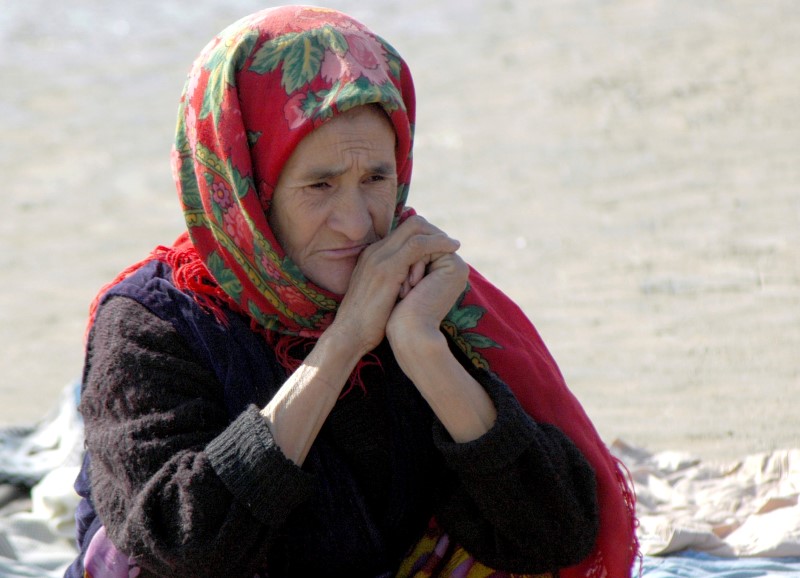By Olzhas Auyezov
ALMATY (Reuters) - Turkmenistan, Central Asia's biggest gas exporter, has restricted access to foreign currency for local companies and individuals in response to a sharp fall in export revenues, Turkmen businessmen say.
Foreign currency controls would normally be a crisis measure implemented when a country is worried its foreign currency reserves are being seriously depleted.
In the case of Turkmenistan, the government does not disclose the size of its reserves, so it is difficult to gauge how serious the problem is. The central bank and finance ministry did not respond to Reuters questions on the subject.
Any economic crisis could have far-reaching consequences in Turkmenistan, an ex-Soviet country that borders Iran and Afghanistan. It has been under one-party rule for 25 years.
Turkmenistan has long relied on gas supplies to Russia as its main source of hard currency revenue. Moscow halted purchases in January after sharply reducing them last year in a pricing dispute. Total Turkmen exports dropped 38.5 percent last year and were down a further 41.5 percent in the first quarter, the most recent period for which official data is available.
Late last year the central bank stopped selling foreign currency to local businesses, said one Turkmen entrepreneur who spoke on condition of anonymity because he feared official retribution for speaking openly about the issue.
Foreign exchange operations are now handled by commercial banks which have a varying degree of access to foreign currency, the businessman said.
He said companies working on priority projects, such as the construction of the Turkmenistan-Afghanistan-Pakistan-India (TAPI) gas pipeline, were still able to access foreign currency. Another project moving at full steam is the construction of facilities for the 2017 Asian Indoor and Martial Arts Games, a matter of prestige for the Ashgabat government.
For anyone else, finding dollars or euros has become a tough task. Another Turkmen businessman, also speaking on condition of anonymity, told Reuters that after requesting $10,000 from his bank, he would only get $500.
The restrictions on businesses accessing foreign currency have not been previously reported.
Turkmenistan's central bank forwarded all requests for comment to one official who could not be reached by telephone despite repeated calls over several days. The Finance Ministry said it had no information on the matter.
FOREX SHORTAGE
Turkmenistan's central bank has kept the exchange rate for the manat currency
On the black market, the manat is quoted at about 5.5-6.0 per dollar, against the official rate of 3.5 per dollar. The black market though does not have enough foreign currency in circulation to meet demand.
Consumers also face problems. Ordinary Turkmens can only buy their monthly pay's worth in foreign currency at local banks, upon presenting a pay slip. Money transfers from abroad made through the Western Union system are being paid out only in local currency since June, according to a Reuters correspondent in Ashghabat.
A Russia-based customer service representative at WU said the company had no special restrictions on transfers sent to and from Turkmenistan. A Dubai-based WU spokeswoman for the region could not be reached for comment.
"When I travel abroad I have to go to each one of my relatives and friends to get as much foreign currency as I can," said the first businessman. "My bank still hasn't completely filled an order I placed last December."
Because of the shortage of foreign currency, prices for imported goods have soared. One of the businessmen said his family's grocery bill has gone up by a quarter over the last 12 months and some items, such as electronics, have become 50 percent more expensive.
PROTECTING RESERVES
The central bank does not publish data about its reserves. The International Monetary Fund said last November that Turkmenistan had sufficient foreign reserves to cover about 30 months worth of imports, which by the IMF's standards is a comfortable level.
However, with no reported progress on resuming gas exports to Russia, Ashgabat may be trying to eke out its reserves for as long as possible by imposing restrictions now.
In Russia's absence, China has become the main buyer of Turkmen gas, purchasing about 30 billion cubic metres a year, or three-quarters of what Russia used to buy at the peak.
It is unknown how much China pays for that gas. If the contracts are in line with global practice, the prices will be linked to oil benchmarks and so will be well below the amounts Turkmenistan would have earned a few years ago.
Export receipts from China are also likely to be significantly offset by debt repayments, as Beijing has since 2009 provided Ashgabat with more than $8 billion in loans for the development of its giant Galkynysh gas field.

Construction of the TAPI pipeline will be fully completed in 2019 at the earliest.